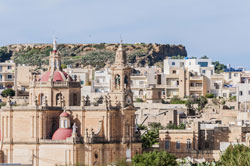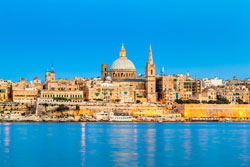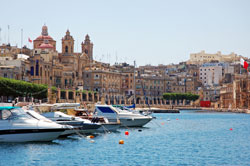Malta Teases As Business Destination
The archipelago of Malta lies in the sparkling southern half of the magnificent Mediterranean, some 100 kilometres south of Sicily. Its location has given it great strategic importance throughout history and a succession of royal powers have battled to rule the archipelago. An independent member of the Commonwealth, Malta joined the European Union (EU) in 2004 and became part of the Eurozone in 2008. It is a favoured tourist destination with its warm climate, numerous recreational areas and architectural and historical monuments. It is now, however, also becoming increasingly popular as a business destination.
With competitive operational costs, easy access to European and North African markets and availability of highly qualified and educated employees, Malta is a jewel of a jurisdiction to create and manage a business. Alongside the Maltese Language, English is also an official language of the country, and the laws of the land are therefore enacted both in Maltese and English. Some 88% of the population speak English, 66% speak Italian and 17% speak French. This widespread knowledge of second languages makes Malta one of the most multilingual countries in the EU.
 The Maltese economy is primarily based on services, but officials have recently been working very hard to develop the country’s financial sector. Malta’s economy experienced a growth spurt following membership of the EU that was financed in part by EU grants. Productivity gains, a rise in foreign investment and export diversification have all contributed to the strong performance. Direct public involvement is being stripped back in key industries such as telecommunications, postal services and port services. Officials also plan to privatise shipyard activities, gas distribution and petroleum operations in the near future.
The Maltese economy is primarily based on services, but officials have recently been working very hard to develop the country’s financial sector. Malta’s economy experienced a growth spurt following membership of the EU that was financed in part by EU grants. Productivity gains, a rise in foreign investment and export diversification have all contributed to the strong performance. Direct public involvement is being stripped back in key industries such as telecommunications, postal services and port services. Officials also plan to privatise shipyard activities, gas distribution and petroleum operations in the near future.
Foreign investors are attracted by a tax regime that allows income tax on dividends to be offset against corporate tax. The tax regime is based on a full imputation system created to avoid double taxation of the same income (at company level and, thereafter, at shareholder level) which, together with the tax refund system, offers very efficient tax planning opportunities. Malta has one of the most comprehensive participation exemptions in the EU, with the dividends and capital gains related with a participating holding in Malta being exempt from taxation.
 As residents of a EU member state, companies in Malta benefit from the principles of the European Treaty, including the principle of freedom of establishment and free provision of services. EU directives also apply, thus guaranteeing a modern and efficient legal system. The Parent Subsidiary Directive and the Interest and Royalties Directive also mitigate taxation in other EU countries, thus increasing the efficiency of the investments made in Malta. There is stamp duty exemption in the sale of shares of companies whose main assets or business interests are located outside Malta. Malta also has no capital tax or wealth tax.
As residents of a EU member state, companies in Malta benefit from the principles of the European Treaty, including the principle of freedom of establishment and free provision of services. EU directives also apply, thus guaranteeing a modern and efficient legal system. The Parent Subsidiary Directive and the Interest and Royalties Directive also mitigate taxation in other EU countries, thus increasing the efficiency of the investments made in Malta. There is stamp duty exemption in the sale of shares of companies whose main assets or business interests are located outside Malta. Malta also has no capital tax or wealth tax.
In terms of business opportunities, many international investors use Malta to receive interest or royalties in order to benefit from an attractive tax regime. Malta has a rich maritime tradition and is one of the major ship registers worldwide. Its shipping industry is well-organised and efficient, with a strategic view of support to the maritime transport industry. Malta offers particularly efficient solutions for the purchase of yachts to be used for private purposes. In recent years, Malta has become the reference jurisdiction for the e-gaming industry. The major and more lucrative online game operators are present in Malta, which represents 10% of worldwide online gaming.
 Malta offers a distinctive blend of the modern and the authentically antique. Situated in the heart of the Mediterranean, it is just three hours away by plane from the main European cities. Due to their strategic location, the Maltese Islands have been uses as a meetings venue for centuries. These days Malta, Gozo and Comino hosts many corporate and association conferences as well as incentive events. The Island´s five- and four-star hotels include internationally renowned chains and boutique up-market properties. Numerous conference venues also add to the local infrastructure supporting the meetings industry.
Malta offers a distinctive blend of the modern and the authentically antique. Situated in the heart of the Mediterranean, it is just three hours away by plane from the main European cities. Due to their strategic location, the Maltese Islands have been uses as a meetings venue for centuries. These days Malta, Gozo and Comino hosts many corporate and association conferences as well as incentive events. The Island´s five- and four-star hotels include internationally renowned chains and boutique up-market properties. Numerous conference venues also add to the local infrastructure supporting the meetings industry.
The island of Malta is the largest of the three major islands that constitute the Maltese archipelago. Its sister island Gozo is greener and arguably more distinct in character. There are regular ferry-crossings and seaplane departing from Malta to Gozo that makes it an ideal place for small meetings, tours and incentive activities. Gozo is renowned for its diving, walking, cycling and abseiling sites. This island features a variety of hotels and farmhouses that offer an alternative authentic accommodation product and contribute to the overall unique experience.
Over a million tourists visit Malta every year, and at times there are three times more tourists there than there are residents. An English-speaking environment facilitating good communications, endowed with hospitable people, also makes Malta a safe and perfect destination for doing business. If you’re feeling brave, just go and follow in the conquering footsteps of the Phoenicians, Carthaginians, Romans, Arabs, Normans, Spanish, the Knights of St. John and Napoleon.

